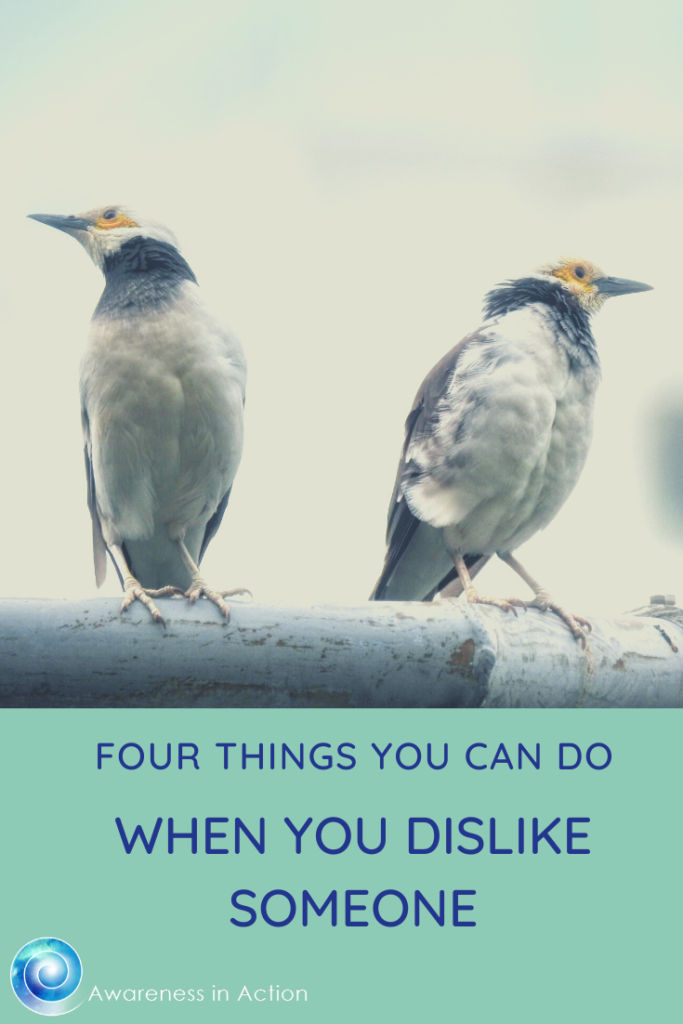We are probably all familiar with the uncomfortable feeling that maybe we dislike someone. Perhaps we get introduced to a new colleague at work and immediately we have the sense that we are not going to get on. Or a friend introduces us to their new partner and straight away we are sure we are not going to hit it off.
It’s not a welcome feeling. It is much more pleasant to like someone and to want to spend time with them. When we dislike someone, we can spend a lot of time managing our dislike, rather than focusing on the content of the relationship.
So, what can we do?
Take Abraham Lincoln’s advice on dislike
Abraham Lincoln is known to have been unusually fair-minded. When choosing his cabinet on becoming president, he astounded political opponents by appointing several of his former rivals to key positions. He based his decision on whether he felt they qualified for the post, rather than personal slights or bitterness.
He is said to have made the following comment,
I don’t like that man. I must get to know him better.
How might this help us? We can be open to the possibility that when we met our new boss, or our friend’s partner we reacted to something about them that irritated us. Perhaps it was even enhanced by the mood we were in. If we manage to hold this initial impression as just that—an impression—we can give ourselves the chance to look deeper.
Making the effort to get to know someone better is a way of respecting their individuality. Instead of going with our prejudices we are willing to investigate a bit deeper and see if we were wrong.
Listen to Henry Longfellow
The popular nineteenth century poet, Henry Wadsworth Longfellow also has a quote that is relevant here.
If we could read the secret history of our enemies, we should find in each man’s life sorrow and suffering enough to disarm all hostility.
Even if we follow Lincoln’s advice and take time to get to know someone we dislike, perhaps we decide we still dislike them! We might not consider people we dislike as our enemies, but we certainly don’t want to spend time with them. Even thinking about them can stir us up and make us upset.
I have thought about this quote from Longfellow a great deal and often use it in workshops. It is a challenging idea isn’t it? To understand, without consultation or confirmation, that the person we are struggling with will have all kinds of suffering in their lives. To do this we need to remind ourselves that everyone wants to find some kind of happiness in their lives. Maybe some people go about it in ways we don’t understand but still, they want to be happy. At the same time, we want to avoid pain and suffering and yet, inevitably, life has many challenges.
So, the person we dislike will most likely also be dealing with all kinds of pain and disappointment—just like we do. Reminding ourselves of this does not necessarily mean we will begin to like the person, but we might start to feel a kinship. If we can shift our focus from the characteristics that they have that annoy us and look instead at their vulnerability, our dislike can maybe take a back seat.
Look for the things you like
One of the things that happens to me when I do decide that I dislike someone, is that I almost resist finding out things about them that are positive. It’s as if once I have decided that I don’t like someone, then I don’t want to be shown that my dislike is unfounded and unnecessary. When I realise that this is happening then I can give myself a shake and try to take another look. It’s not something I am proud of and that spurs me on to try a bit harder.
One way to do this is to observe how other people interact with them. If people you get on with, also get on with the person you feel you dislike is it possible you are missing something? Have you met their family—partner, children? How do they all seem together. Seeing people with their families can help to soften a negative impression.
You can also look more closely into the person’s character. It is hard to dislike everything about someone—although for me there are a few politicians that challenge this idea. Perhaps they have a sense of humour or are kind to animals. Are they good at their job or a great cook?
Is there anything that you share? Do you have a similar taste in music, art, books? Have you both enjoyed a recent movie, or TV programme?
It takes effort to look past your own opinions but if it helps in finding a place of ease in this uncomfortable dynamic then it is well worth it.
Give the person you dislike the benefit of the doubt
Once we have decided that we dislike someone it can be hard to cut them some slack. It becomes easier to expect to be annoyed with them, or to judge their actions. This is where we can really try to give them the benefit of the doubt.
Again, being able to do this requires that we pay attention. Instead of jumping to a judgement, or an opinion we will need to pause, and to look deeper. Before we decide that the person who we dislike is behaving again in a way we dislike, we need to take time to check if there is some room for doubt. Could it be possible that we have misunderstood, or somehow got the wrong end of the stick?
In practicing giving someone the benefit of the doubt, the Golden Rule can be helpful. The rule recommends that we, treat others as we wish to be treated. There are some important clues here. We need to remember that it is likely that there are people who dislike us! For some people, we will be that person they dread meeting, who presses their buttons. It does not feel so good to realise that you are someone’s object of dislike. We might feel it’s not fair, or that we don’t deserve it. Perhaps we wonder how someone as well-meaning as we try to be could be disliked.
So, in addition to these four things we can do when we dislike someone, we can ask ourselves what we would request of someone who dislikes us. The answer to that question contains a whole lot of clues that we can use when dealing with our own dislikes.


You might be interested in this new zoom+online course which starts on 15 June 2021 HOW DO YOU WANT TO FLOURISH IN YOUR RIPE OLD AGE?
Awareness in Action is dedicated to building a community of people interested in living a life of meaning and purpose based on sustainable wellbeing. If you would like to join with us, you could make a start by sharing and commenting on the ideas you find in the blogs on these pages. Your story is part of our journey.

